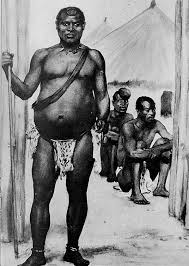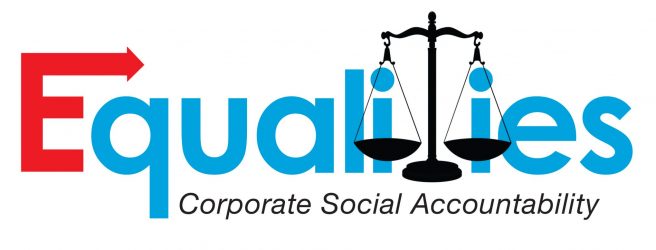First published on 10/05/2014
ESRL asks: Will there ever be freedom from RACISM in employment?
This year is 2014 and the question employees should be asking is “When will we have FREEDOM from Racism?
When the ESRL revisited the last 120 years it found these employment-driven key dates:
 Chief Lobengula Khumalo was both a major employer of human resources and protector of natural resources in Bulawayo, Matabele, until 1894. This revered employer Chief Lobengula, it is stated, was the most intelligent man in the nation with marvellous memory; and even had sympathies and a soft spot for white missionaries. Well! After various concessions and treaties, Chief Lobengula was tricked into signing over his Kingdom and its rich natural resources to the authority of a Mr Cecil John Rhodes. This Mr Cecil Rhodes became the new employer. Chief Lobengula’s experience in the hands of racist employer Mr Cecil John Rhodes after 1894 led to the death of Chief Lobengula.
Chief Lobengula Khumalo was both a major employer of human resources and protector of natural resources in Bulawayo, Matabele, until 1894. This revered employer Chief Lobengula, it is stated, was the most intelligent man in the nation with marvellous memory; and even had sympathies and a soft spot for white missionaries. Well! After various concessions and treaties, Chief Lobengula was tricked into signing over his Kingdom and its rich natural resources to the authority of a Mr Cecil John Rhodes. This Mr Cecil Rhodes became the new employer. Chief Lobengula’s experience in the hands of racist employer Mr Cecil John Rhodes after 1894 led to the death of Chief Lobengula.
 Mahatma Gandhi, a British-trained lawyer faced employment restriction to practice law in Calcutta, India. After a lengthy struggle to overcome the employment barrier he faced, in 1920, Mahatma Gandhi penned the following iconic statement: “First ‘they’ ignore you, then ‘they’ laugh at you, then ‘they’ fight you, then you win.” Well, to his end of life, Mahatma Gandhi did not practice law. The struggle for an end to racism in employment still continues.
Mahatma Gandhi, a British-trained lawyer faced employment restriction to practice law in Calcutta, India. After a lengthy struggle to overcome the employment barrier he faced, in 1920, Mahatma Gandhi penned the following iconic statement: “First ‘they’ ignore you, then ‘they’ laugh at you, then ‘they’ fight you, then you win.” Well, to his end of life, Mahatma Gandhi did not practice law. The struggle for an end to racism in employment still continues.
 Martin Luther King’s civil rights march in Washington DC 1963 was about equal rights to and; right to employment for African-Americans. In the heat of the occasion, he said that, to paraphrase ‘he had a dream that one day people of all colours will work and live together as equals and in freedom. Instead of ending racism in employment in USA, well, ‘they’ rather killed him and killed the dream of an America in which racism in employment exists no more.
Martin Luther King’s civil rights march in Washington DC 1963 was about equal rights to and; right to employment for African-Americans. In the heat of the occasion, he said that, to paraphrase ‘he had a dream that one day people of all colours will work and live together as equals and in freedom. Instead of ending racism in employment in USA, well, ‘they’ rather killed him and killed the dream of an America in which racism in employment exists no more.
 Nelson Mandela, who is our recent icon on fighting for equality in employment, at a racist Azanian court of Johannesburg, in 1964, challenged racist employers on employment rights for the Afrika Person; he said that, to paraphrase, the ‘…right to equal employment was an ideal he cherished in a free society in which all persons live in harmony and it is an ideal he was prepared to die for…” Instead of the racist employers ending racism in employment in Azania, well, ‘they’ rather denied him martyrdom for the ideal of equal employment by jailing him for 27 long years and succeeded in killing-off sentiments on equality in employment.
Nelson Mandela, who is our recent icon on fighting for equality in employment, at a racist Azanian court of Johannesburg, in 1964, challenged racist employers on employment rights for the Afrika Person; he said that, to paraphrase, the ‘…right to equal employment was an ideal he cherished in a free society in which all persons live in harmony and it is an ideal he was prepared to die for…” Instead of the racist employers ending racism in employment in Azania, well, ‘they’ rather denied him martyrdom for the ideal of equal employment by jailing him for 27 long years and succeeded in killing-off sentiments on equality in employment.
Thus it is that in the footsteps of Chief Lobengula since 1894, Mahatma Gandhi since 1912, Martin Luther King since 1963, and Nelson Mandela since 1964, activists for equality in employment have hoped against hope that racist employers would at least pay some attention to ending racism in employment. Well, globally, racist employment of all resources itself has not shifted.
The UK Government of Her Majesty Queen Elizabeth II enacted an Equality Act 2010 to persuade employers in the UK to be ‘sensitive’ to itemised “protected characteristics”. ESRL notes with regret that 4 years on, do we have to wait for another 116 years to find out if employment will be free of racism?
Alecho-oita, a director at Equalities Sensitivity Rating comments as follows;
“It is very disappointing that in 2014 the employment process as a labour institution that engages different ethnicities to enhance/advance both their wellbeing and that of society, is still dogged by accusations of racism. Employees, I suspect try to make sense of their employment while weighed down by degrees of subtle or overt racism. For them there is no getting away from racism at the workplace. It is in recognition of this dilemma that Queen Elizabeth’s government constructed an Equality Act 2010 on ‘protected characteristics’ to persuade employers to get to grips with racism in employment.”
Editors Notes:
- Mr Alecho-oita is available for interviews on 0044-798-459-4876 or jack.a@equalitiessensitivityrating.com.
- ESRL can be mailed at info@equalitiessensitivityrating.com
- Below are sampled sources on the uses of ‘no freedom from racism in employment’:
- When was the last time you called someone racistto their face? As someone who can only remember using the phrase “that’s pretty racist” at someone…In Australia, the word ‘racist‘ has lost all its meaning, The Guardian
- Labor’s shadow attorney-general, Mark Dreyfus, said the ”extreme” changes proposed by Senator Brandis would ”give the green light to racism..in Racism‘always wrong’: Barry O’Farrell takes aim at George Brandis over ‘right to be bigoted’, Sydney Morning Herald
- You know this scene all too well: you’re in a supermarket queue and the person in front of you whispers a racistepithet under their breath. Apparently…in Racism is not ignorance – it is an assault on our freedom, Mail & Guardian Online
- In an interview with Fairfax, Mr Wilson said that racial discrimination laws are leading to certain racially loaded terms being used within communities…in Human Rights Commissioner Tim Wilson believes race hate laws are bizarre and unequal, Herald Sun
- Expats In Australia Put Up With Racial DiscriminationAustralia may have an open door to expats from all over the world, but some find when they….in Expats In Australia Put Up With Racial Discrimination, Pars Herald
- Students at Sandfields Comprehensive School, Port Talbot, have been showing Racismthe Red Card — and won a competition by impressing judge…in Sandfields pupils showing racism the red card with inclusive art project on Mandela, Southwales Evening Post
- Parit Buntar MP Datuk Dr Mujahid Yusuf Rawa (left) and Penang Bishop Sebastian Francis at the unity dinner for non-Muslims in Bayan Lepas…in Malaysia needs a dose of peace and forgiveness to fix racism, says Penang bishop, The Malaysian Insider

